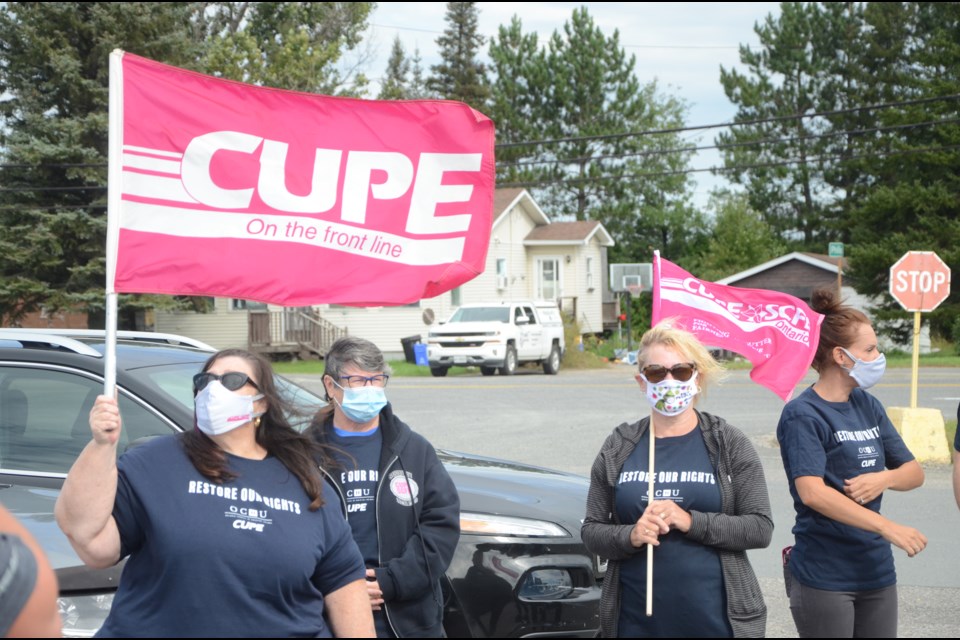Sudbury health-care workers voiced their objections to the possible loss of hard-earned workplace rights because of Ontario's Bill 195 at two different protests Thursday.
While the province is calling it appropriate legislation for reopening Ontario, there has been widespread opposition, especially from unionized health care workers who see the bill as an unfair opportunity for employers to override collective bargaining rights.
The new act was passed in late July and gives employers in Ontario what the government is calling a flexible response for getting businesses and companies back on their feet after going through pandemic shutdowns and layoffs.
Front line workers see it differently. They don't like that employers have the right to change work locations, reassign shift times, reassign vacations and evn change regular job duties.
"Doug Ford claimed that health-care workers were all heroes during the pandemic. But we went from heroes to zeroes in a matter of minutes. So it's just insulting and a big slap in the face to take rights away," said Christyna Cox, vice president of CUPE Local 1182, representing unionized workers at Extendicare Long Term Care Centre on York Street in Sudbury.
Cox, who is also a personal support worker (PSW) said so far this has not happened at Extendicare York where there are roughly 300 unionized workers.
"Actually our employer has been very good in that sense,” said Cox, speaking to Sudbury.com outside of her workplace Sept. 3.
“We are very lucky in that nobody has been told to do different job duties or different departments or anything like that. So we're very lucky. But it's just even having the ability that they can do that it is scary. It's scary for a lot of our members and it's uncomfortable.
"Coming to work is uncomfortable. It's the unknown that is just not right."
Cox said the other big worry for workers in long-term care homes is that employees are just not being given enough time to do their jobs to look after residents properly. She said that's why workers are also pushing for a new Time-to-care Act which would mandate that patients actually be given at least four hours of personal hands-on care per day.
Right now, said Cox, residents are being given only minutes of care per day where support workers must help patients wake up in the morning, get them washed, get them dressed, assist with toilet functions and then get them their food.
Cox said the staff-to-patient ratio "is insane" for the demands it puts on staff and the residents. She said in some cases a PSW is assigned to look after 15 residents in the morning in a two hour period.
"You have two hours to get 15 people up. It is not realistic and it's not right. It is inhumane to be honest with you," said Cox.
She said it was one of the reasons why several residents took part in the information picket outside the nursing home Thursday.
"The residents do support the workers. We have unbelievable residents. They care for us. They see how run off our feet we are. They see how hard we work," said Cox.
She added that the problems experienced during the pandemic have "shone a light" on the many problems that exist in long-term care homes. Coz said she is hopeful that public attention will bring about changes she believes will improve conditions in LTC homes.
Another protest against Bill 195 by CUPE and the Ontario Council of Hospital Unions also took place in Hanmer Sept. 3. It was attended by many supporters and union members including Sudbury and District Labour Council President Mike Bellerose, who is also president of CUPE Local 4705.
Union representatives said they will fight the bill until it’s repealed.
A Northern Ontario representative for CUPE Ontario said they are fighting for employees in general, not just their own members, because everyone will be affected by Bill 195.
“It needs to be repealed, and the government needs to understand the working class deserves better,” said Bryan Keith, speaking at a rally in Hanmer Thursday morning near the office of Nickel Belt MPP France Gélinas.
The government used COVID-19 as an excuse to pass Bill 195, but even when there were upwards of 1,000 new cases a day, it wasn’t needed, and it isn’t needed now, he said.
“Workers have been doing the right thing from the very start of the pandemic, and this bill is the government’s way of trying to take back some control and power,” Keith said.
There are multiple issues the unions take with Bill 195, he added. For example, it gives employers the right to cancel parental leave, as well as bereavement and vacations.
“We bargained for our vacation time in our collective agreement, and this government thinks vacation is something we are not entitled to,” Keith said.
Also at issue is an employer’s ability to change hours of work and the location of work, he said.
“Many of our members are single parents taking care of their households, and this bill gives an employer the right to change a day shift to an evening shift with very little notice, or to even change their location of work from say Hanmer to Lively,” he said.
“Those are some of the major issues, but there are so many others to deal with.”
Sudbury was one stop on a provincewide tour of rallies, Keith said. These rallies mark the beginning of the battle against Bill 195. He said the unions will do whatever it takes to have the Bill repealed.
“This is our first battle with Bill 195, and we will continue until it’s repealed. It’s an attack on every worker in Ontario.”
Anyone with questions or concerns are encouraged to reach out to the unions, Keith said.
-With files from Arron Pickard
